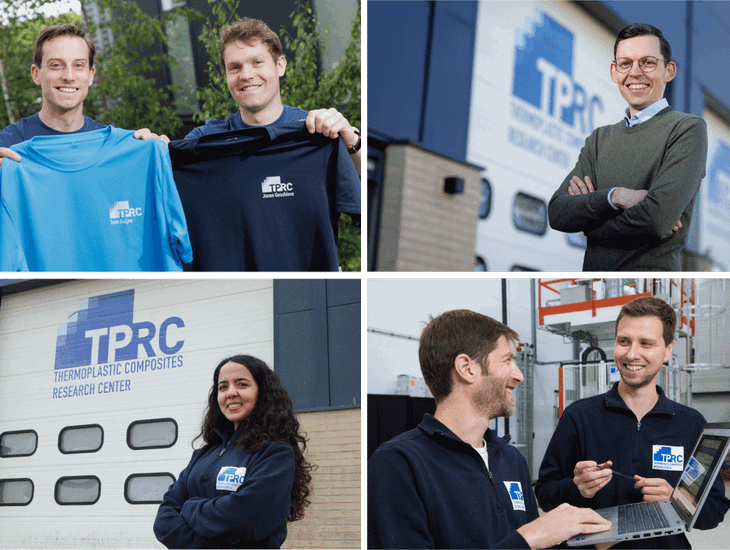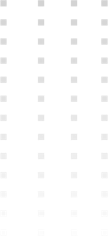#TPRCminds | Dennis & Rens
PhD Researchers
‘Our passions are our common ground’
Dennis Brands and Rens Pierik are cut from the same cloth. These new ‘acquisitions’, who recently joined the TPRC as new PhD students, are both working on the same project. They were complete strangers. An exciting step, both for them and for TPRC.
Read other #TPRCminds interviews with Jeroen (Research Engineer), Wouter (Assistant Professor), Yannick (PhD Researcher), Ramona (PhD Researcher), Sebastiaan (AniForm), Jagadeesh (PhD Researcher), Vanessa (PhD Researcher) and Emiel (Research Engineer).

What makes this step so exciting?
Dennis: “In terms of our private lives, it’s a bit of a leap of faith for my wife and me. I started here in February, and that also prompted our move to Twente. We’ve found a place in Hengelo. I should actually say ‘Back to Twente’. After obtaining my degree in Mechanical Engineering at the University of Twente, I put in a four-year stint at AniForm Engineering. That was really cool. I worked with a bunch of people who market pioneering technology to major players in the world of aviation.”
Rens: “What excites me about it is that we are both working on the same project – a sort of dynamic duo! When you are getting started, how do you work out who does what? On what aspects of this teamwork do we need to agree in advance? We were total strangers, yet we had more or less decided to spend four years working closely together on our research project. Happily, our passions are our common ground, our backgrounds are very similar, and we are not afraid to challenge one another with critical questions. So far, so good. Although, we already have a long list of things that we know we won’t be able to solve in just four years.”
OK, so what issues do you hope to solve? What is the focus of your PhD research?
Dennis: “The name of our project is PERFECT, which is an acronym for ‘press forming without defects’, i.e. the press forming of thermoplastic composites. We want to better understand how defects arise in the press forming process, as an aid to prediction.”
Rens: “We hope that our simulation models will be the key to this. Our goal is to help industry cut costs while boosting its production numbers. Not only that, but the materials involved will be more complex than ever before. For instance, what will happen if you try to form multiple layers at 400 degrees, in just a few seconds? As yet, we can’t always predict the outcome with any accuracy.”
Dennis: “We hope that our contribution to the understanding of materials will cause the automotive industry to more fully embrace thermoplastic composites as well. For the time being, however, we are focusing mainly on the aviation industry.”
Experience with simulations
Speaking of the automotive industry, Dennis has already gained plenty of experience in that sector. It was during an internship with Audi, in Germany, that he became sold on composite materials. “I was already familiar with forming simulations, but there I saw how they were used in practice. I worked in a department that focused on long-term projects. We came up with ideas for things that you won’t yet find in today’s Audis. For instance, we explored forming processes for fibre-reinforced plastics. As a student, I found that quite scary – how would they respond to my ideas? Luckily, my simulations worked out pretty well. I had plenty of contact with people from other departments. Then, just after I had delivered a presentation (which I had to do in German), they said they wanted something in a few days. The problem was that it actually took a few days to run my simulations, so I sometimes had to work like crazy, but I got it done. I have now found that very same vision of the future here at TPRC. Thermoplastic composites are becoming extremely important for many companies but, in terms of global research, very few people are working in this field. There are still many challenges to be met. I’m only 28 years old, but I’m already working at the boundaries of our knowledge. That’s the place that really sparks my interest.”
Industrial applications
Before he arrived at TPRC’s door, Rens had already discovered that he needed more job satisfaction. After graduating in December 2018 (also from the University of Twente, and also in Mechanical Engineering), he ended up at the Veluwse Machine Industrie (VMI), the global market leader in tyre-building machines. “I worked on the extrusion process for unvulcanised rubber. I learned a lot, but the doubts started to creep in. I missed that pioneering aspect, the thrill of discovery and the excitement of working on the future. I had always been interested in thermoplastic composites, so when this opportunity came along I seized it with both hands. TPRC’s direct contacts with industry were the deciding factor for me. Here, you can focus on the future but, at the same time, you get to see how things are used in industry. Exactly what I was looking for.”
Chocolate and an old moped
Dennis: “TPRC is a really great place to work. You have plenty of freedom, so you can try out your own ideas and learn to trust them. The locals here would describe the workplace atmosphere as ‘lekker informeel’ (pleasantly informal). When it comes to the facilities, you name it – they’ve got it. There is a very open atmosphere and no sense of competition – we’re all in it together. In some ways, my research reflects my passion for cooking. When making chocolates, you have to cool precisely in order to crystallize the chocolate properly for a beautiful result. Thermoplastics, too, crystallise when cooling down during press forming, much like the chocolate. Also when baking bread, I seek the link between the ingredients, the process and the result, as I do in my research. How does each process step change the product and what gives the best result? I may be a bit of a perfectionist, but that’s certainly not out of place at the TPRC.”
Rens: “We are both really driven by our curiosity. There are no sacred cows as far as we are concerned. I am currently refurbishing an old moped in my spare time. It’s mainly a form of relaxation but, even so, I also become happy when I learn to understand the underlying mechanisms.”
Our series #TPRCminds introduces you to the people behind our success. Who are they? What is their background? What drives them and what do they dream about? How do they look at the future of thermoplastic composites? Continue reading other #TPRCminds episodes:
Photos ©Gijs van Ouwerkerk




